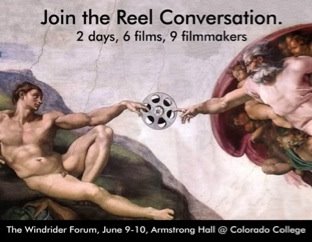Faith in Film: Part I

"The first demand any work of art makes upon us is surrender. Look. Listen. Receive. Get yourself out of the way." -- C.S. Lewis in “An Experiment in Criticism”
 Last week, I attended a seminar put on by Fuller Seminary entitled “Faith in Film.” Taught by Hollywood screenwriter and Fuller professor, Craig Detweiler, the seminar (and later weekend film festival) was an intensive apologetics and theology course for the seminarians in attendance, and an inspiration for me. It was the perfect educational vanguard as I prepare to begin graduate film school at NYU in less than three months.
Last week, I attended a seminar put on by Fuller Seminary entitled “Faith in Film.” Taught by Hollywood screenwriter and Fuller professor, Craig Detweiler, the seminar (and later weekend film festival) was an intensive apologetics and theology course for the seminarians in attendance, and an inspiration for me. It was the perfect educational vanguard as I prepare to begin graduate film school at NYU in less than three months.It’s interesting, we always talk about Jesus Christ as The Word but rarely ever refer to Him as The Light. St. John 1:4 speaks of Him as the light--the light that can illuminate the darkness, reveal truth and lead us safely through life’s obstacles. And films that show forth that light, His light--be they from Christian filmmakers or not--were the topic of our few, but intense, days together.
Take a sacramental approach to life, Craig told us. Be less interested in proofs, creeds, reason or dogmas. It’s about enchantment, mystery and beauty. The sacred amidst the profane is what being a Christian is all about.
For Plato, all of life was an illusion. Truth was not to be found here on earth. One had to look upwards to the heavens for revelation. Aristotle was different. He believed that life and truth was embedded in everything around us. All of nature cried out with revealed truth. It’s the old debate between Transcendence on the one hand and Immanence on the other and it has filtered down into Christian philosophy to become one of the defining ways in which we view the world around us.
Is God radically apart from and beyond any sort of existence in our material universe, or is He existing and operating within our world, pervading and sustaining everything? If it’s the former, then art is unnecessary because ultimately everything is going to burn apocalyptically anyway. If the latter, then the the world is enchanted with, suffused by, and cannot get away from Christ. Art therefore becomes an expression of the divine all around us. If God is everywhere and in everything, is there truly such a thing as “secular”?
Theaters are the new temples of worship in America. Post-moderns (post-post-moderns?), especially Americans, confront their issues and carry on their cultural conversations in the context of movies. Film, with its massive screens, elevates even the most mundane issues to something of vast importance. We must be willing to wrestle with the big issues. If movies keep asking the questions, are Christians ready with the answers? Are they even willing to engage in the conversation in the first place?
Christians were once the greatest patrons of the arts. Some of this world’s greatest masterpieces came from Christians wanting to reflect the majesty and wonder of God and His creation in art. How have things so changed? Now Christians view art with suspicion and mistrust. This is especially true of film. (Make no mistake, film is every bit as much an art form as literature, painting or music--as with any art form, there is great art and there is bad art.) That must change.
Movies specifically came of age in a very progressive era. Religious reformers and social workers fought for the poor and downtrodden amidst a world in the throws of industrialization and urbanization. Interestingly enough, when film first began, the church saw it as a wonderful megaphone for good. Pastors preached about it’s important in society. That didn’t last long, unfortunately.
It’s time to return to that model. It’s time to realize that films are like modern parables--stories that convey greater truths--to afflict the comfortable and work as artistic trojan horses. If film is the new global literacy, how do Christians hope to communicate if they cannot speak that language?
“Christian” is a noun, not an adjective. There is no such thing as a Christian movie. There is only good art and bad art. Can a beautiful God inspire bad art and what does that say about many “Christian” films?
This is not to say that some Christians haven’t been using film for years. But what have those films looked like? Generally they are flaccid stories with overt altar calls at their conclusions. They are films that preach to the choir, dishonest in their unwillingness to meet the intended viewer--the unsaved--where he is. They tend to deal with sinners’ terrible lives and the hope found in the Christian community. And there is certainly some truth to that, but only partially. Thankfully, newer Christian films are bucking that template. They tend to deal with life’s pain and agony--be it found outside or within the community of believers. New Christian films have begun to stop pretending that there is no fallenness within the Church. We are all ragamuffins in need of God’s transformation.
Protestants tend to make terrible movies because they are solely message driven. They preach at the expense of story, plot or character development. For the Protestant filmmaker, ensuring the message is delivered, no matter what is lost in the delivery, is paramount. Protestants practice a word-based faith; images make them uncomfortable. That is why there is a proliferation of (largely abominable) Protestant Christian fiction, but not Protestant Christian films.
Liturgical Christians on the other hand, tend to make far better movies for the very reason that they are an icon-laden faith. A film’s message is not found within the story, it is the story. Unlike Protestants who are unused to and uncomfortable with symbols and iconography and therefore avoid them, liturgicals suffuse their films with symbols and iconography to reflect God. Their films tend not to overt altar calls, but honest assessments of our world as it is as well as the deeper truths of God’s nature--compassion, forgiveness, redemption, unbridled love and the like.
Consider how the modern church uses the Scriptures (and film) to try and confront a wayward world and bring them to Christ. Primarily, we use the Paulian letters--those epistles of St. Paul (and St. James and St. Peter, etc) that make up the bulk of the New Testament. There’s just one problem with that--St. Paul never wrote his letters for unbelievers.
Think about it. These letters were written to established churches, both for their edification and chastisement when they erred. St. Paul’s audience in all of these letters are already believers. The standards by which he judges them are the standards of someone who has become a follower of Christ--rigid standards indeed, but hardly the standards by which one would expect an unbeliever to adhere. We cannot use private documents meant to discipline the church to judge the world. We cannot hold the world to the same standards to which we ourselves are held.
The contemporary church uses the Bible as a weapon, not a trauma kit. In doing so, we become Pharisees, touting the law to support our superior moralistic claims. In doing so, we also become the very people with whom Christ conflicted more than any other. It was the sinners whom Jesus loved, fellowshiped with, and spent all his time. It was the Pharisees who he resisted and for whom he saved his harshest and most condemning words. The contemporary church needs to look long and hard at its message and its intentions. If Christ were to appear in our midst today, would he say, “Well done good and faithful servant” or “You brood of vipers...you whitewashed tombs”?
Judge not lest you be judged. We’ve attacked the world for its unrighteousness, all the while ignoring the massive plank in our own eyes. We must repent. We must look to our own sin before the sins of others. I think the world understands that the church sees it as a bunch of unregenerate heathen sinners. I think we’ve done a pretty good job of preaching condemnation, wrath and hellfire. I think they get it. Perhaps it is time for another approach--a new, untried message.
How does Hollywood and the world see the Church--judgmental, intolerant, hypocritical and closed-minded. Who wants to be a part of that!? Certainly not me. It is time for a change. As a church, we are known more for what we are against than what we are for. We have communicated the judgement of God very well; what about the grace?
To be continued...


5 Comments:
sounds like a great conference!
DB : )
By grace, you got it. You are now officially a disciple of Craig
Detweiler.
And you articulate the message very well. I am eager to read the next installment!
Excellent post and I couldn't agree with you more on the comparision contrast of Protestant/Catholic films. Whenever I flip through channels and come across movies made by persons of the more evangelical side of Christianity (usually starring Kirk Cameron, BTW), sometimes they come across to me sort of like an after school special. I am not going to downplay the lack of artistry of these films, but there is obviously a market out there for them and if they decide to make an average movie with their message then so be it. It is just a pity that the people that need the message of Christianity will pan these film, whereas a great film with a moral message made by a Catholic (Passion of the Christ) was seen by millions and millions.
What an awesome post Brandon. You are an inspiration to me.
You just nailed the divide. These days, all Christians are interested in are books and films of the Apocalypse (usually starring Kirk Cameron, BTW), that cater to the lowest common denominator in art and recipient.
When the Left Behind books came out, tons of my non-Christian friends were reading them, which got me very excited until I picked one up and checked it out. What drivel.
And don't get me started on the filmed versions--what was Ralph Winter thinking!? Either they glory in the end of the world or they are, as you said, after school specials that go down like gum drops without any nutritional value.
But on the liturgical side you have things like Babette's Feast, the films of Bergman, The Spitfire Grill, The Last Temptation of Christ, etc, etc, etc.
You nailed it, my friend.
And don't forget about Monty Python's Life Of Brian!!!
Post a Comment
<< Home